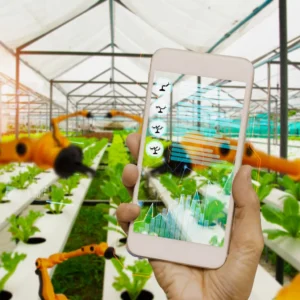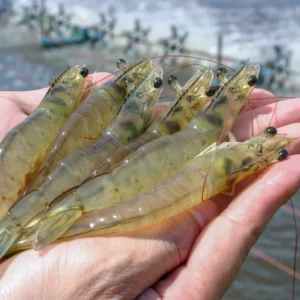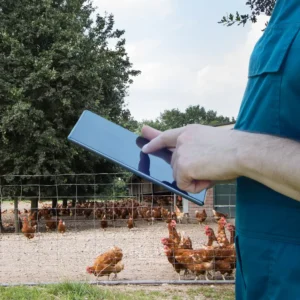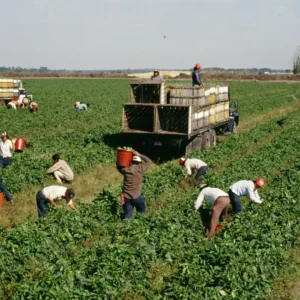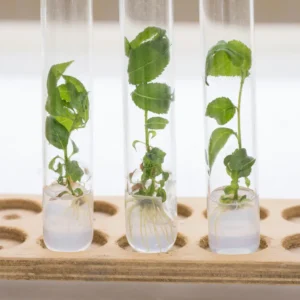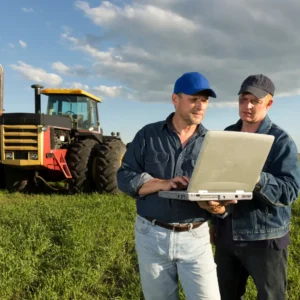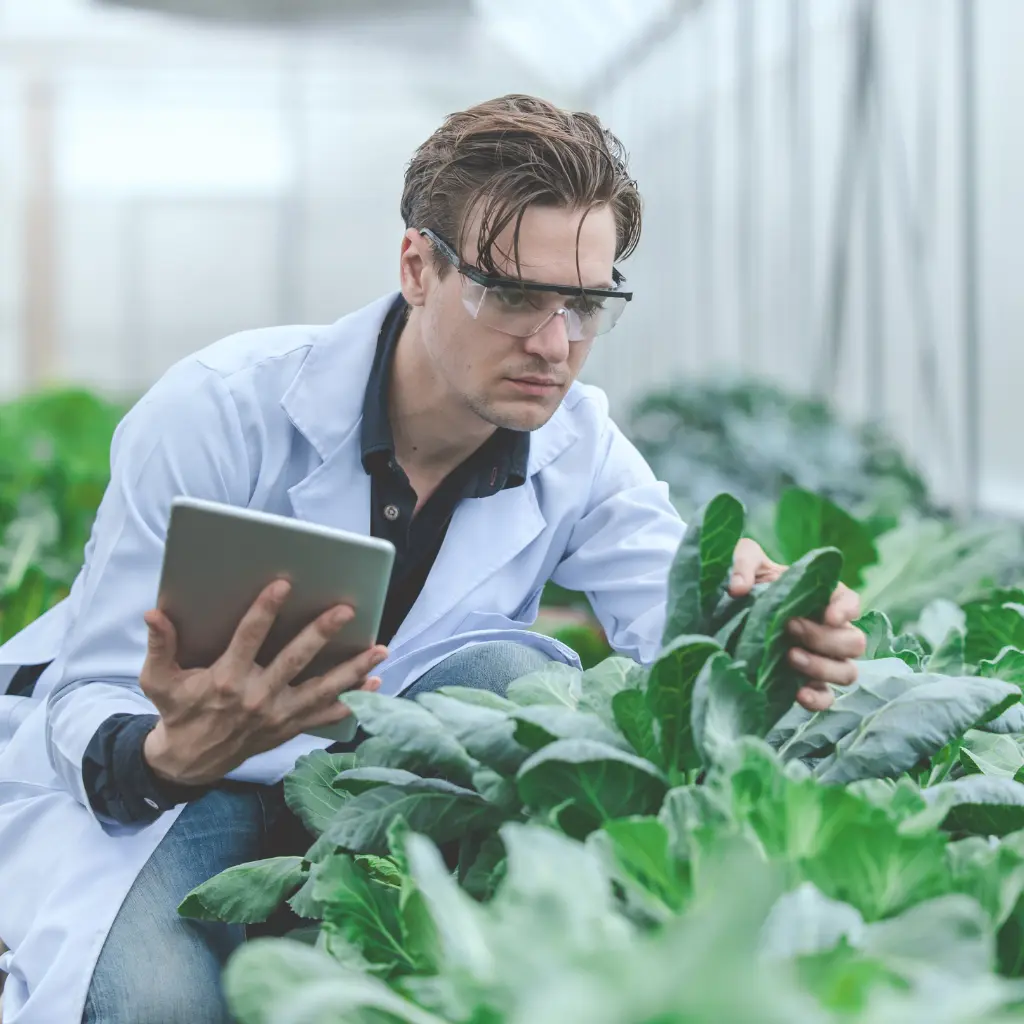
Revolutionizing Farms for a Sustainable Future
AI in Precision Agriculture
Emerging innovations are rapidly changing the global agricultural landscape, and Artificial Intelligence (AI) is in the spotlight. This piece explores the remarkable strides in AI-driven precision agriculture.
Delve into the world of advanced AI-driven crop monitoring, soil analysis empowered by AI, precise irrigation systems, AI’s role in pest prediction, and the automated management of nutrients.
Unravel how these underpinnings are not only improving farm productivity but also innovatively revolutionizing sustainable farming practices.
Table of Contents

Arindam Roy
An Automation Consultant with 25+ years of IT Experience
The Digital Farmer: Harnessing AI for Crop Surveillance
The digital farmer now employs Artificial Intelligence (AI) for practical and advanced crop surveillance beyond traditional farming methods. Integrating AI in agriculture helps identify diseases, pests, and poor plant nutrition on farms.
This is made possible through machine learning algorithms that analyze data collected from drone and satellite imagery. Such AI-driven crop surveillance systems can spot problem areas in the field, enabling timely treatment and preventing widespread damage.
This significantly improves crop yield and farm productivity. Therefore, harnessing AI in agriculture creates a more sustainable farming practice and a significant stride in food security.
Digging Deep: AI-driven Soil Insights
Understanding the soil’s composition and health is pivotal for successful farming. Through AI-driven soil insights, farmers can now dig deeper into this knowledge. Cutting-edge technology utilizing AI is already available to analyze soil samples and provide a thorough evaluation of their overall condition.
This includes data on nutrient levels, pH value, moisture content, temperature, and the presence of any diseases or pests. Predictive AI models can forecast how certain crops fare in the different soil types.
This facilitates farmers in making informed decisions on crop rotation, seed varieties to use, or the best time to plant, eventually improving the yield and reducing the burden on the environment.
Water Wisdom: Smart Irrigation with AI
Irrigation remains a critical farming component, but traditional methods often lead to water wastage. AI can revolutionize farming by promoting smart irrigation. Leveraging AI algorithms’ predictive power, farmers can analyze weather patterns, soil conditions, and evaporation rates to optimize their irrigation schedules.
This AI-based method reduces water wastage and helps in achieving sustainable farming. This accurate, data-driven approach also conserves water by detecting leaks or system failures in advance.
AI-powered smart irrigation can thus enhance water resources’ efficiency, contributing immensely to global water conservation and food security efforts.
Guarding Greens: AI in Pest Forecasting
Artificial Intelligence has emerged as a game changer in pest forecasting in agriculture.
Utilizing algorithms and predictive modelling, AI can proactively identify the likelihood of pest attacks. It can analyze vast data sets around weather patterns, plant health, and pest behaviour collected from satellites, drones or on-the-ground IoT devices.
Scientists are even training AI to distinguish between species to detect harmful pests promptly. This precise prediction and early warning system allows farmers to take preventive measures, reducing crop loss and minimizing pesticide use.
Thus, AI in pest forecasting is revolutionizing sustainable agriculture and enhancing food security.
Tailored Crop Treatments: AI in Precision Agriculture
Tailored crop treatments are a fundamental component of precision agriculture, aimed at giving individual attention to maximize productivity and reduce waste.
Farmers can gather precise information about soil conditions, crop health, and weather patterns using varied technologies like GIS mapping, drones, and sensors. This data enables them to customize treatments for specific areas rather than apply blanket treatments across fields.
For instance, they can identify the spots needing fertilization or pesticides, reducing costs and environmental impact. Ultimately, tailored crop treatments facilitate sustainable farming, focusing on efficiency and conservation – demonstrating precision agriculture at its best.
Nurturing with Knowledge: Automated Nutrient Dispensing
In the era of intelligent farming, ‘Automated Nutrient Dispensing’ stands as a significant innovation.
This technology provides accurate and optimized nutrition to crops. It works on the principle of precision farming, where nutrients are supplied based on a plant’s specific needs at a particular growth stage rather than following a generic schedule.
Sensors in the dispensing system measure various soil parameters like pH, moisture level, and nutrient content. Based on this data, controlled amounts of nutrients are used to fulfil the crops’ requirements.
This promotes healthy growth and minimizes wastage of resources, nurturing the environment alongside.
Optimizing Output with AI Analysis
Optimizing output is a crucial aspect of modern industries, and with AI analysis, it has become much more efficient. AI employs machine learning algorithms to analyze industrial processes and detect patterns and trends humans might overlook.
These insights predict production inefficiencies and potential machine failures, reducing downtime and minimizing waste. Also, AI helps streamline the inventory management and supply chain, ensuring on-time deliveries and customer satisfaction.
Further, with AI-driven data analytics, companies can optimize their resources, increase productivity, and ultimately enhance their output. Thus, AI analysis is a powerful tool for output optimization and overall business growth.
Farm to Future: Predictive Agriculture with AI
Artificial Intelligence (AI) transforms agriculture through predictive analytics, paving the way to a more productive and sustainable future. Predictive Agriculture with AI offers farmers data-driven insights that can optimize planting and harvesting strategies, improve yield, and reduce waste.
Advanced algorithms can analyze weather patterns, soil quality, crop maturity, and more, predicting outcomes and suggesting strategies for risk management. The use of drones and autonomous farming equipment further enhances this innovative approach.
Thus, AI in agriculture revolutionizes food production and helps conserve resources while maintaining economic profitability.
Boosting Crop Yields: AI's Analytical Approach
AI’s analytical approach can significantly boost crop yields. It can process vast data sets from satellite images, weather forecasts, and real-time field data to predict optimal planting times and inform farmers about crop health.
AI-powered solutions like precision farming, automatic watering systems, and pest prediction models can significantly increase yields and resource efficiency. Machine learning algorithms can detect patterns and trends that human analysis may miss, enabling farmers to take pre-emptive actions that safeguard their harvest.
Furthermore, AI can inform about the best techniques and suitable crops for cultivation based on soil type, thus significantly optimizing the agricultural processes.
From Soil to Sky: AI's Holistic View of the Farm
AI’s holistic view of the farm embraces every element from soil to sky; it starts from analyzing the soil quality to predicting weather patterns. Through advanced algorithms, AI assists farmers in determining the optimal planting times, watering schedules and fertilizer usage by assessing soil health.
Satellites and drones fitted with AI technology monitor crop growth and help detect potential issues like pests or diseases. Simultaneously, AI-powered weather prediction models facilitate proactive decision-making, allowing farmers to adapt to changing climatic conditions.
This all-encompassing perspective empowers farmers to maximize yields, optimize resources, and build a more sustainable, efficient farming system.
Conclusion
Incorporating AI in precision agriculture is ushering in an era of unparalleled efficiency and sustainability. Beyond mere enhanced yields, this integration promises an eco-friendlier approach to farming.
As the world confronts challenges like resource scarcity and climate change, AI’s role in precision agriculture stands out as a beacon, ensuring a future of productivity harmonized with nature.
Related Articles
- AI in Smart Agriculture – Precision Farming
- AI in Modern Aquaculture – Underwater Harvest
- AI in Animal Farming – Tech Meets Livestock
- AI in Sustainable Agriculture – Green Gains
- AI in Agricultural Supply Chain – From Farm to Table
- AI in Agricultural Biotechnology – Bespoke Crops
- AI in Agri-Finance and Insurance – Safeguarding the Harvest
- AI in Farming Tools and Machinery – Equipped for the Future
- The AI Urban Farming Revolution – Cultivating Cities
- AI in Agricultural Automation – Robotic Revolution
- AI in Post-Harvest Care – Beyond the Harvest
- The Surge of Agri-Tech AI Platforms – Digital Farming
- AI in Combatting Crop Diseases – Healthy Harvests
- AI in Boosting Organic Farming – Natural Nurturing
- AI in Agricultural Supply Chain Management
- AI in Crop Forecasting and Analysis: New Agricultural Era
- The Role of AI in Agricultural Robotics: Revolutionizing Farming
- AI in Smart Greenhouses: Revolutionizing Sustainable Agriculture
Forbes Articles related to AI usage in the Agriculture Sector:

